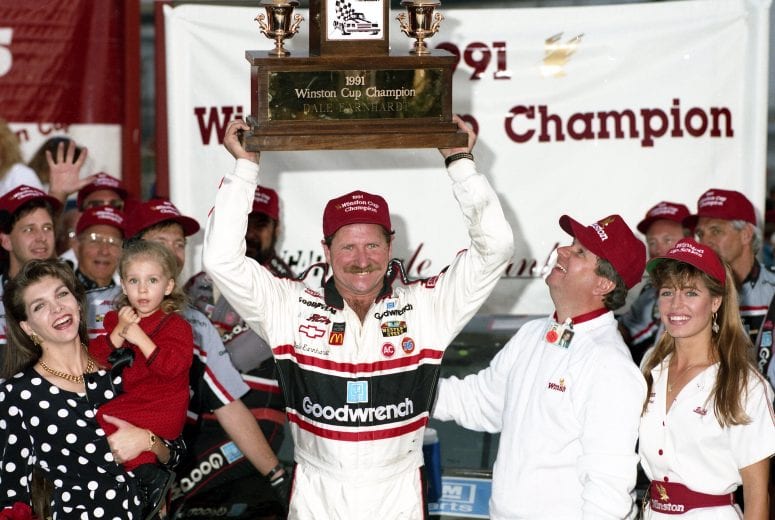Sometimes you get these great ideas . . . and they turn out to be wrong. Oops.
I was casting about for a PTR topic after Sunday’s Texas race, and the perceived youth (at least to me) of the racers you hear the most about got me to thinking of whether Cup racing (and its predecessors) has become more of a sport for the youth. Of course, that initial thought itself was flawed, because Denny Hamlin has already won twice this year and almost won a third time Sunday, and he’s 43, and that’s a year younger than Martin Truex Jr., who stands second in points as of this week.
Still, William Byron keeps coming to mind. He won Daytona, COTA, and Martinsville, and he’s just 26, so my “theory” has to have some validity, right?


Well, maybe not.
There are lots of ways to play with the math and look at driver age, but I chose a relatively easy one and looked at the age of every Strictly Stock/Grand National/(Winston/Nextel/Sprint/Monster) Cup champion since Red Byron in 1949. I was looking for the average-age curve to head downward. It didn’t, at least not clearly.
Here’s what you get, again, using just one of many ways to scramble the numbers.
Decade Average Age of Champion

1950s (incl. ’49) 34.4
1960s 32,4
1970s 36.3
1980s 34.3
1990s 35.5
2000s 30.2
2010s 34.6
2020s (so far) 28.5
AH-HA, you say. Look at the 2000s and 2020s. They’re the “youngest” decades. Yeah, but the 2010s look like the others, and we’re really not far enough into the 2020s, yet, to give it that much weight. Possible? Yes, but not proven.
Let’s look at the numbers some other ways, but first, let’s look at the limitations of this exercise. You’d never see it used in a statistics class, because the “universe” of years/champions is – at 75 – just too small. There are too many possible explanations besides those that show up with addition/subtraction/multiplication/division/etc.
First of all, decades and even centuries are artificial divides we’ve created. They mean nothing to the birds, bees, or the effect “the birds and bees” had on when somebody was born. Years mean something, because they’re connected to the seasons we’ve raced, but beyond that. . . .
Still, we can lean on those artificial lines and come up with a little support. If you take all the NASCAR champs from the 20th century, their average age is 35.3. Since 2000, though, that number has dropped to 32.2.
I’d like to declare victory at this point, but I can’t, because not only can you scramble the numbers lots of ways, but you can find explanations that don’t really need math.
For example, the ‘70s had the oldest average age for champs, 36.3. But 8 of the 10 championships that decade were won by Richard Petty or Cale Yarborough. Petty won his championships at 33, 34, 36, 37, and 41. Yarborough won his at 37, 38, and 39. Between them their average age as champions was 36.6. If those two drivers hadn’t been so dominant, would the ones replacing them in the standings have been older or younger?

Richard Petty and Cale Yarborough. The 1970s could have had a much younger or older average age of champions had these two drivers not dominated the sport for much of that decade. (Unfortunately, both of these images came from the web – Petty from Pinterest and Yarborough from the DuPont Registry – with no information about their origin.)

You can come up with what-ifs for other decades as well.
So if my original theory isn’t correct, what do the numbers tell us. Well, here’s one conclusion that’s hard to argue with: if you want to be the champ, you should be in your 30s. In 75 years of NASCAR Cup Series history, 45 of the champions have been in their 30s, 17 were in their 20s, and 13 were in their 40s. 60% were in their 30s.
Even if you only look at the last 24 years, when our decade averages skew a little toward youth, 16 of the champs have been in their 30s, compared to only 6 in their 20s and 2 in their 40s.
There will always be outliers. Chase Elliot won the championship at 24 in 2020, but it was 16 years earlier that Kurt Bush took the title at 25, and no one younger won in between them.
The upper end is interesting. Since 2000, only two champions have been 40, and they were exactly 40, not older. That could be another situation where individuals mean more than numbers, because of the eight championships won by drivers 40 or older since 1949, three were won by Lee Petty and three by Dale Earnhardt. There are statistics, and there are helluva-drivers.

Just for the record, Bobby Allison remains the oldest racer ever to win the championship – at age 45 – and the way drivers retire today, he may hold this record forever. (Photo from the NASCAR Hall of Fame via NASCAR Archives via Getty Images)
If there is a trend toward younger champions and winners, I’ll suppose – without any statistical proof – that it might be due to the greater frequency of major, fundamental changes to the cars. The first of those I remember was the shift from bias-ply to radial tires. Some older drivers didn’t thrive after that. In this century, NASCAR has thrust three “new cars” at competitors, and it could be that more young drivers have adapted well to those changes.
That’s for somebody else’s number-crunching to figure out, though. My head hurts from this.
Frank’s Loose Lug Nuts
I could have confused the issue above a lot more by including NASCAR’s Cup-like divisions from the 1950s, the Short Track Division and the Convertible Division. That would have added a dozen more champs, and with some creative logic, we also could have gone even farther, as I’ll note later.
My point in mentioning this is that by adding the Short Track Division – which featured identical cars to those running what was then known as the Grand National Division but on tracks shorter than one-half mile – I would have included perhaps NASCAR’s most impressive “forgotten” champion, Jim Reed of Peekskill, N.Y. In the nine-year existence of the Short Track Division, Reed won its championship five times, and those were the core years for the division, when it ran its fullest schedules. He won an astounding 49 races of 147 run, exactly one-third of the events, even counting those races he didn’t enter.


All total, Reed won 60 Short Track Division starts, plus 7 Grand National races (including the 1959 Southern 500), even though he never competed fulltime in GN. He also won 11 races in what is now the ARCA Menards West Series but then was the higher-level Pacific Coast Late Model Series, and 4 in the Eastern Late Model Division, a cobbled-together series offering race dates to tracks after the demise of the Short Track Division. Reed, in fact, was considered the champion of that series for two of its three-seasons in existence.
That’s 82 victories in what we would call today NASCAR touring series events in about a decade of racing. He even finished second in a NASCAR Speedway Division race in 1952. The NASCAR Hall of Fame is far too interested in currying favor with its new generation of fans to ever consider Reed for membership, but he belongs, no question.
By the way, Reed’s “day job” during his racing career was selling large trucks, and Jim Reed’s Commercial Truck Sales remains a vibrant business in Cortland, N.Y. If you go to the company website and look under its blog, you can fine a great appreciation of Reed, written when he died five years ago. (I will note that, after I read it, I got email solicitations for some time to buy a truck.)
(PHOTO CREDIT NOTE: – The cover photo is by Dozier Mobley and belongs to Getty Images)
Frank Buhrman



Always remember Jim Reed’s ’59 Chevy Batmobile being driven round Darlington from the Joe Weatherly Stock Car Museum at our first Southern 500 in 1966. Didn’t realize until I read the postcard that Jim’s 1959 Southern 500 win was Goodyear’s first major stock car win and that it was Goodyear who presented the car to the museum: https://www.akpool.co.uk/postcards/26652471-postcard-jim-reed-1959-southern-500-59-chevrolet
Reed not only is terribly unappreciated as a racer, but he’s the kind of racer we grew up with: fulltime job selling trucks with racing on the side. No guarantee of anything from NASCAR, just earn every penny by your talent. I always thought that was what made this country great, not charters and provisionals.
Great reading! I totally enjoyed it and it sure made me stop and think.
Thank you.
I love it Frank. A most timely subject since an over 40 driver who has never won a championship has won three of eleven races this season. Is this his year? Will he join that elite group of Lee Petty, Dale Earnhardt and Bobby Allison? Don’t know but your article is going to make me watch that a little closer.
Thanks for another one!